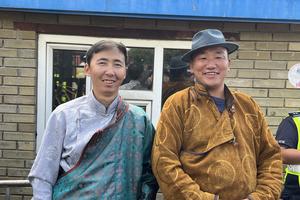5 Things to Know About Mongolia as Pope Francis Prepares For His Trip
Despite the small population, Christianity in Mongolia dates back to the seventh or eighth century when Nestorians (Persian Christians with a great missionary zeal) first visited the area.

Mongolia is one of the world’s largest landlocked nations, sandwiched between its much larger and more powerful neighbors, China and Russia. It has one of the smallest Christian communities in the world — a community nevertheless galvanized by Pope Francis’ upcoming trip, which is scheduled to take place Aug. 31–Sept. 4.
Ahead of the Pope’s historic trip, here are a few key facts to know about Mongolia.
1) Mongolia has only a few thousand Christians.
Officially, Mongolia is home to just 1,300 Catholics, significantly less than 1% of the country’s 3.3 million people. That’s small, but in the early 1990s, the country had virtually zero native Catholics. This is mainly because of the nation’s communist regime, which lasted from the 1920s until 1990 and repressed all forms of religion, especially the dominant Tibetan Buddhism.
Missionaries reentered the country to begin rebuilding the Catholic community from the ground up after the regime ended, and the Vatican reestablished diplomatic relations with the country in 1992. In 2003, the Cathedral of Sts. Peter and Paul was built; in 2016, the first native-born priest of the modern era was ordained.
Despite the small population, Christianity in Mongolia dates back to the seventh or eighth century when Nestorians (Persian Christians with a great missionary zeal) first visited the area. Catholic Franciscan missionaries preached to Mongolians as early as the 13th century.
More than half of the population identifies as Buddhist, with Muslims making up 3.2%, Shamanist 2.5%, Christian 1.3%, and about 40% claiming no religion, according to the CIA World Factbook.
The Apostolic Prefecture of Ulaanbaatar, a missionary area that does not have enough Catholics to warrant a diocese, has jurisdiction over the entirety of Mongolia. It is led by 49-year-old Cardinal Giorgio Marengo, who is the apostolic prefect and the world’s youngest cardinal. He was given his red hat by Pope Francis in August 2022.
2) There aren’t many people in general: Mongolia is the least densely populated country in the world.
Three million people may sound like a lot, but not for a vast country like Mongolia. Its population density of just two people per square kilometer makes it the emptiest in the world overall. Vast portions of Mongolia consist of an arid and empty steppe environment where cattle graze and the mostly nomadic people are few and far between. Despite this, Ulaanbaatar, the capital, is home to about half of the country’s population and is a relatively large and dense city of 1.6 million.
3) The weather in September in Ulaanbaatar is generally pleasant, but Mongolia is known for its extreme climate.
Situated on a high plateau, the average high temperature in Ulaanbaatar in September is 66 degrees Fahrenheit (19 degrees Celsius), while the low is 36 F (2 C). Overall, though, Ulaanbaatar is the coldest capital city on earth. The country as a whole has a windy, cold, dry, and changeable climate, which is steadily becoming more inhospitable and unpredictable as the global climate changes, forcing more and more people to migrate to the increasingly overcrowded capital city in search of livelihoods.
4) Mongolia isn’t doing great, by most measures.
A majority of the country’s residents live as nomadic livestock herders, a profession that, as previously mentioned, is becoming increasingly difficult. In part this is because of a changing climate but also because of damage to grazing lands due to the proliferation of cashmere goat herding in areas previously dedicated to cattle.
Overcrowding in the capital city, as well as other hardships such as high levels of pollution, has led to a rise in poverty, alcoholism, and domestic abuse among many of the former herders. Christians are sometimes regarded with suspicion, and Mongolia has had to deal with a rise in xenophobic ideologies among its citizens against people coming from its larger neighbor, China.
5) The Pope’s full visit schedule has already been released.
Among other activities, Pope Francis will make a courtesy visit to President Ukhnaagiin Khürelsükh, briefly meet the chairman of the State Great Khural, which is the Mongolian Parliament, and visit Prime Minister Oyun-Erdene Luvsannamsrai. He will also meet with bishops, priests, missionaries, consecrated persons, and pastoral workers at Sts. Peter and Paul Cathedral, the apostolic see of the prefecture of Ulaanbaatar.
The Pope will later take part in an ecumenical and interreligious meeting at Hun Theatre in Ulaanbaatar and will celebrate Mass at the Steppe Arena in Ulaanbaatar.
Read the Pope’s full schedule here.
- Keywords:
- mongolia















